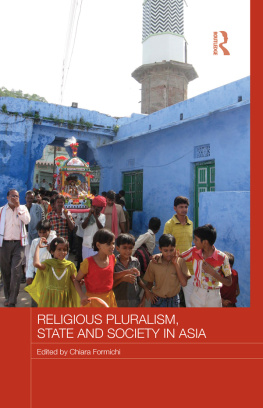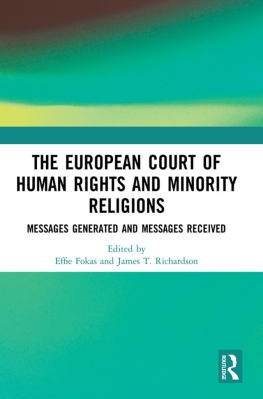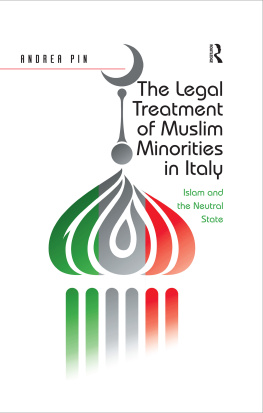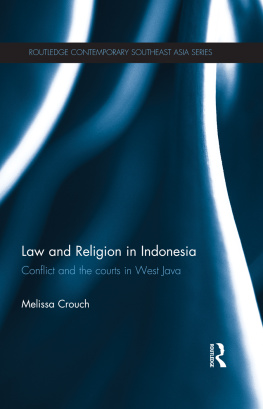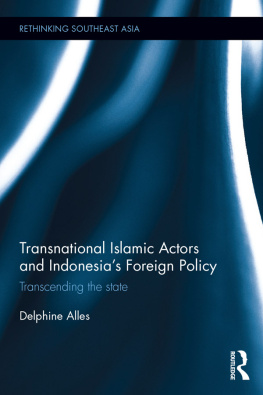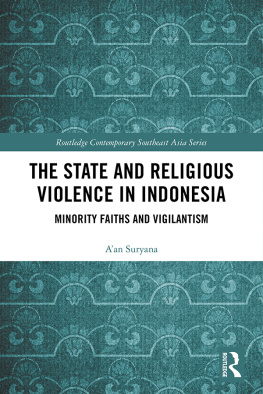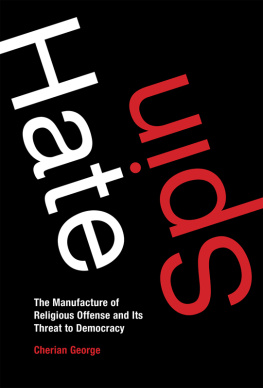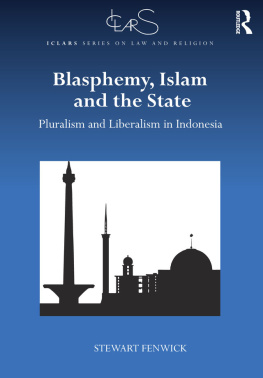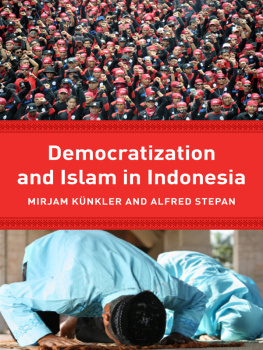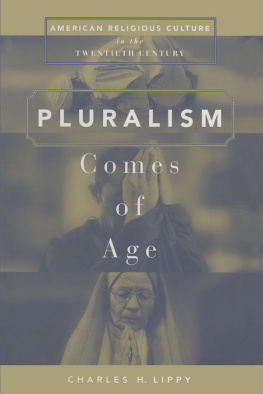RELIGIOUS PLURALISM IN INDONESIA
Threats and Opportunities for Democracy
Edited by Chiara Formichi
SOUTHEAST ASIA PROGRAM PUBLICATIONS
AN IMPRINT OF CORNELL UNIVERSITY PRESS ITHACA AND LONDON
Contents
Chiara Formichi
Robert W. Hefner
Sidney Jones
Kikue Hamayotsu
Evi Lina Sutrisno
Mona Lohanda
Lorraine V. Aragon
Silvia Vignato
James B. Hoesterey
Michel Picard
Christopher R. Duncan
Acknowledgments
This volume is the outcome of the fifth conference in the Cornell Modern Indonesia Projects series The State of the Field of Indonesian Studies, which was held at Cornell University in April 2019.
I am thankful to Eric Tagliacozzo, as director of CMIP, for giving me the opportunity to run this workshop. This was a most stimulating intellectual gathering that not only brought together colleagues from across the US, Europe, and Indonesia but also involved Cornell faculty and students across multiple departments as they joined in the organization, panels, and discussions. Michael Miller and Connor Rechtzigel, doctoral students in the Departments of History and Anthropology, respectively, supported us with tech and content. Panels were chaired by Alexandre Pelletier (an SSHRC and SEAP postdoctoral fellow) and by Seema Golestaneh (Near Eastern Studies), Kaja McGowan (History of Art and Visual Studies), Andrew Willford (Anthropology) and Marina Welker (Anthropology). Thomas Pepinsky (Government) presented the paper Islam, Identity, and the Organizational Roots of Political Tolerance (coauthored with Jeremy Menchick, Boston University), which was not included in this volume.
I would like to acknowledge the unswerving support of the Southeast Asia Program, especially in the persons of Abby Cohn, director, and Thamora Fischel, associate director. James Nagy and Divya Sriram, administrative assistants in the Southeast Asia Program, ensured that things were in place, that we were fed delicious food, and that everything ran smoothly. This was especially appreciated this time aroundI returned to Ithaca from an unexpected overseas trip just a few hours before the beginning of the event, and it was reassuring to know that I didnt need to worry.
Generous financial support came from many corners of the Cornell campus. Thanks go to the Mario Einaudi Center for International Studies, the Southeast Asia Program, the Cornell Modern Indonesia Project, the Religious Studies Program, the Judith Reppy Institute for Peace and Conflict Studies, the Institute for the Social Sciences (now Cornell Center for Social Sciences), the Comparative Muslim Societies Program, the Department of History, the Department of Asian Studies, the Department of Anthropology, and the Department of Government, in collaboration with the American Institute for Indonesian Studies.
Last but not least, thanks go to Tsuguta Yamashita (PhD student in the Department of Asian Studies) for finalizing the manuscript, and to Sarah Grossman, the editor of SEAP Publications, and the editorial boards of SEAP Publications and Cornell University Press for publishing this volume.
Abbreviations
Bakorpakem Badan Koordinasi Pengawas Aliran Kepercayaan Masyarakat (Coordinating Agency to Oversee Peoples Beliefs)
Banser Barisan Ansor Serbaguna (Multipurpose Ansor Front)
BTP Basuki Tjahaja Purnama, also known as Ahok, vice governor of Jakarta, 201214, governor, 201416
DI Darul Islam
DPR Dewan Perwakilan Rakyat (National Legislative Body)
DPRD Dewan Perwakilan Rakyat Daerah (Regional House of Representatives)
FKUB Forum Kerukunan Umat Beragama (Inter-religious Harmony Forum)
FPI Front Pembela Islam (Islamic Defenders Front)
Gerindra Gerakan Indonesia Raya (Great Indonesia Movement)
Golkar Partai Golongan Karya (Functional Party)
HMI Himpunan Mahasiswa Islam (Islamic Student Union)
HTI Hizbut Tahrir Indonesia (Party of LiberationIndonesia)
ISIS Islamic State of Iran and Syria
KAGRI Kementerian Agama Republik Indonesia (Indonesian Ministry of Religion)
KIP Kartu Indonesia Pintar (Smart Indonesia Card, national program for public education)
KIS Kartu Indonesia Sehat (Healthy Indonesia Card, national program for public health)
KJS Kartu Jakarta Sehat (Healthy Jakarta Card, Jakarta program for public health)
Masyumi Majelis Syuro Muslimin Indonesia (Consultative Body of Indonesian Muslims)
MMI Majelis Mujahidin Indonesia (Council of Indonesian Mujahidin)
MPR Peoples Consultative Assembly
MUI Majelis Ulama Indonesia (Indonesian Ulema Council)
NKRI Negara Kesatuan Republik Indonesia (Unitary National Republic of Indonesia)
NU Nahdlatul Ulama (Renaissance of the Ulama)
PAN Partai Amanat Nasional (National Mandate Party)
PAS Parti Islam Se-Malaysia (All-Malaysia Islamic Party)
PBB Partai Bulan Bintang (Crescent and Stars Party)
PD Partai Demokrat (Democratic Party)
PDI-P Partai Demokrasi Indonesia Perjuangan (Indonesian Democratic Party of Struggle)
Perda Syariah Peraturan Daerah Syariah (Regional Regulation Based on Syariah)
PKB Partai Kebangkitan Bangsa (National Awakening Party)
PKI Partai Komunis Indonesia (Indonesias Communist Party)
PKS Partai Keadilan Sejahtera (Prosperous Justice Party)
PPP Partai Persatuan Pembangunan (United Development Party)
SARA suku, agama, ras dan antar golongan (ethnicity, religion, race, and intergroup [conflict])
SBY Susilo Bambang Yudhoyono (former president and chairman of the Democratic Party)
UIN/IAIN State Islamic University system
THE LIMITS OF PANCASILA AS A FRAMEWORK FOR PLURALISM
Chiara Formichi
Indonesia, a country of over 250 million people, made of 18,000 islands, 1,300 ethnic groups, and over 300 languages, built itself as an independent nation-state grounded on a commitment to Unity in Diversity (or Bhinneka Tunggal Ika). This motto, etched on each and every reproduction of the national emblem, was a match to the postcolonial republics founding philosophy, illustrated by President Sukarno (190167) in 1945 and referred to as the Pancasila (i.e., the Five Principles of nationalism [kebangsaan], humanitarianism [perikemanusiaan], deliberation among representatives [permusyawaratan-perwakilan], social welfare [kesejahteraan] and the belief in One God [ketuhanan]).
Seventy years after the proclamation of independence, this edited volume opens a number of windows on how the Indonesian state, its government bodies, civil society groups, and individuals have experienced Pancasila as a framework for the attempted integration of minorities and majorities across the archipelagic state. Written by scholars of Indonesia belonging to a variety of disciplinary backgrounds including anthropology, sociology, history, political science, and religious studies, the chapters in this volume flesh out the identity of Pancasila as a philosophy and ideology that enabled postcolonial Indonesia to portray itself as an inclusive container for many different peopleseven if it meant molding Hinduism into the one book, one prophet, one god paradigm, thus armwrestling an established religious tradition into a new form that would fit under the framework. They also examine the historical and political trajectories that have brought about a less sophisticated and more contradictory situation, in which public discourses depicting Islam in Indonesia as localized and tolerant run parallel to the strengthening, and public affirmation of exclusivist majoritarian Islamism. The chapters offer analyses of contemporary phenomena (Islamist majoritarianism) and events (the Ahok trial); the changing legal and social status of certain minority groups (from local beliefs to Tamil Hindus, Confucianism, and non-Sunni Muslims); interfaith relations (in Bali and Maluku); and the role of Islam in Indonesias foreign policy.


